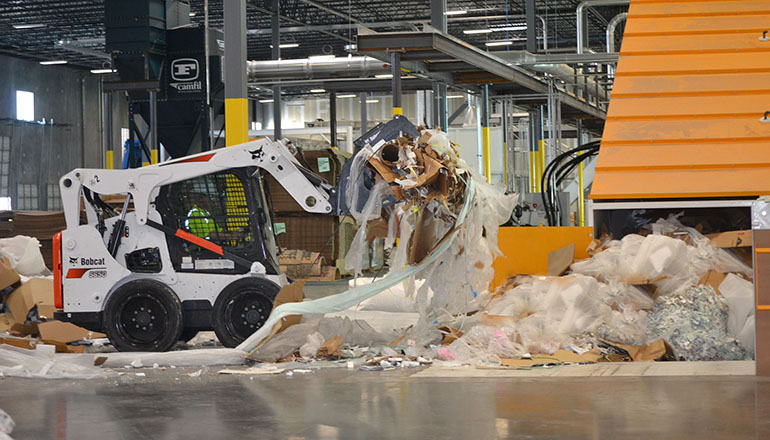NuCycle Ramps Up Florida Renewable Fuel Plant, Plans to Build More
While the facility was built to support cement manufacturer CEMEX, plans are to build more facilities in Miami, Greater Atlanta and Massachusetts.

NuCycle Energy has launched a facility in Plant City, Fla., to make alternative renewable fuel primarily as a coal substitute exclusively for one nearby cement manufacturer.
The plant, which came online in April, is fully operational and ramping up to process 150,000 tons a year of postindustrial materials, primarily process and packaging residuals from manufacturers, distributors and retailers. Among suppliers are major brands, such as Walmart, PepsiCo, Coca-Cola, Tropicana and Williams-Sonoma.
While the facility was built to support cement manufacturer CEMEX, plans are to build more facilities in Miami, Greater Atlanta and Massachusetts in the near future, according to Jim LaDue, chief operating officer for NuCycle Energy.
“We preselect companies as suppliers that generate specific clean material types, primarily labels, specialty papers, plastics and food packaging. We can take it all, and we can take it mixed and blend it at our facility,” says LaDue.
The company, initially under the name Materials Lifecycle Management Company (MLMC), originated in Massachusetts where it supplied a biomass power plant.
MLMC decommissioned the Massachusetts plant and relocated to Missouri when Massachusetts began supporting hydropower and natural gas over coal combustion. When CEMEX signed a multiyear contract, the company shut down in Missouri where it had no contracted customer and built the Florida plant to solely support CEMEX.
To date, the rebranded NuCycle has converted more than 300,000 tons of non-recyclable materials, replacing more than 200,000 tons of coal with an 80 percent carbon neutral fuel alternative.
NuCycle has not had a hard time finding high-volume suppliers over the years.
“When you see a push for change, it starts where the most impact can be cultivated, and that’s the big companies that are viewed as larger generators of solid waste. So, a lot of national brands are trying to increase their sustainability presence as they face public pressure to divert and show what they are doing,” says LaDue.
NuCycle inspects materials to ensure they meet raw material specs, then introduces the feedstock into piles where it’s preblended based on characteristics such as energy value. Then, it’s fed on a receiving conveyor where processing starts.
The 30-ton-per-hour automated process involves shredding and grinding material to a finished particle size of 4-inch minus. Next, ferrous and nonferrous metals are removed, and then begins the densification process to compact the material into the finished product—Enviro-Fuelcubes that replace coal as power to make cement. One ton on average replaces .9 tons of coal.
“Our trailers plug into [CEMEX’s] control room where they set fuel feed rates. Because we can plug into their system, they are in total control of how much is fed in,” says LaDue.
Highland Packaging, owned by Sunoco Products in Plant City, is one of NuCycle’s suppliers. Highland started working with the company in March, providing printed label paper trim, which is heavy, coated paper that is left after making labels.
“They are less than 10 miles from our plant and could provide us a trailer, connect us with services to pull the trailer and were competitive with landfilling in Florida. While we started with just labels, now all packaging residue that’s not food waste goes to NuCycle. It’s unusable to us but can be added to fuel,” says Susan Albritton, category manager for Sonoco.
NuCycle teaches Sonoco employees how to segregate its streams and has kept it simple. It not only takes what’s left from packaging products but takes streams tied to manufacturing, like purges from the production process.
“It’s working very well. Before, it was all going to landfill. Now, with the exception of breakroom and bathroom trash, we are landfill free. In August, we sent only 16 tons to landfill and recovered 194 tons that went to NuCycle,” says Albritton.
CEMEX is also satisfied so far and is talking of expanding its relationship with NuCycle.
“CEMEX’s cement manufacturing process coupled with NuCycle’s cubes offers a zero waste solution. We are exploring replicating this successful experience at the rest of our cement kilns, countrywide,” says Eduardo Pons, CEMEX USA corporate fuels manager.
Synergy Waste Management, a full-service provider that facilitates waste and recycling programs for retailers, represents a sizable supplier base to NuCycle.
“All our national partners have targeted sustainability goals, whether reducing carbon footprint or achieving a zero waste initiative by a certain date. We help them get there, often ahead of their projected date. And sometimes, they can achieve these goals more cost effectively than traditional waste programs like landfilling and incineration,” says Mark Francis, vice president of sales for Synergy Waste Management.
“NuCycle is a crucial partner. They are one of the few manufacturers in the country who have a zero waste process that offers our customers a way to reach their diversion goals,” he says.
About the Author
You May Also Like




.png?width=300&auto=webp&quality=80&disable=upscale)